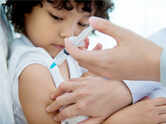How to tell if your child's mental health is suffering during lockdown
TIMESOFINDIA.COM | Last updated on - May 16, 2020, 15:30 ISTShare fbsharetwsharepinshareComments (0)
01/8How are kids dealing with the lockdown?
)

Coronavirus pandemic has come down heavy on all of us, including the younger ones.
A new report says that more than 3 million kids are at a risk of mental health problems resulting from the pandemic. Some findings have even observed that in China, 1 in 5 children showed depressive and anxiety symptoms under the quarantine.
02/8Pandemic is difficult for chidren as well
)

Not only is restlessness fueling amongst adults, but researchers are also saying that children, increasingly are under risk of coronavirus related mental health problems. It's an unprecedented crisis-the little ones feel out of place too. School closures, restrictions and zero playtime outside can feel like a big disruption for them. This also makes it equally important for parents to open up the conversation and talk to their kids about how they are feeling.
03/8Kids can feel stressed too
)

Kids, when they feel emotionally vulnerable or experience a mental health crisis, behave a little differently and might not show the symptoms like adults. Hence, it is important, as a caregiver, you spot signs of trouble in the beginning.
04/8Your child faces difficulty concentrating
)

With the change in schedule, kids too have a lot going in their lives. From extra-curricular activities to online classes and teaching, it can get tough for kids to cope up. One early sign of stress or ailment in kids can be sudden drop in concentration levels. They might require more than usual stimuli to focus on certain tasks or carry out something.
05/8Bad eating habits
)

Be careful about your child's eating patterns in the lockdown. If he or she tends to eat less than usual, is more irritable or fussy about a particular dish or is experiencing other eating issues, consider an intervention. Eating disorders, such as anorexia and bulimia tend to stem more commonly in childhood years and should be treated at the earliest.
06/8Experiencing sleep trouble
)

Stress and anxiety can seriously mess with our sleep cycles and experiencing any kind of discomfort, or fear as a child can be even more disheartening. Insomnia or other sleep trouble can point to something concerning, especially in older kids.
07/8Throws tantrums
)

Even though it is common for children to undergo mood swings or engage in erratic behaviour, if it becomes habitual during the lockdown, it can be an underlying cause of regressive mental health. Some kids may also resort to showing fits, bed-wetting, irritability, social isolation or getting more cranky or attached than usual.
08/8What should you do?
)

As with any mental health problem, it is vital you open the conversation and address the issue. Time might be demanding but this is the period when your children require more help and comforting hugs than usual. Talk to them, make them feel free to express what they are feeling and ease their anxiety, instead of simply dismissing their behaviour as a hissy fit. Make your home a happy place rather than one where children feel shunned or distraught.

















































































closecomments
SIGN IN WITH
FacebookGoogleEmail